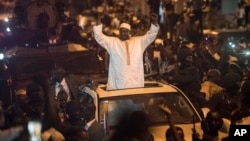Gambia’s new president, Adama Barrow, returned to the capital, Banjul, one week after he took the oath of office in the Gambian embassy in Senegal.
Barrow has been in neighboring Senegal’s capital, Dakar, since last week as the political crisis unfolded in Gambia with President Yahya Jammeh refusing to accept defeat in the country’s December elections. Jammeh only left the country Saturday and went into exile in Equatorial Guinea under threat of a regional military intervention.
Marching bands and dignitaries
At Banjul airport, marching bands were preparing to welcome the new president home amid heavy security presence by Senegalese and Nigerian forces. This did not stop some supporters from pushing through the gate and onto the tarmac, where Barrow was greeted by dignitaries and representatives of the West African regional bloc, ECOWAS.
After a short ceremony, Barrow climbed into a white SUV and sped off, escorted by Senegalese special forces. His supporters packed into vans and taxis to follow him, immediately blocking the road from the airport into Banjul.
The cars blocked the airport road long after Barrow had passed.
“As you can see my vehicle is still stuck here, but I’m still happy because it’s worth it,” said teacher and activist Moussa Seidi said. “Democracy is what we need, so I’m not in a haste at all, even though I have been here since 1 pm. I’m ready to be here until tomorrow morning because what we want we have received that now.”
End of Jammeh era
For Gambians, the arrival of Barrow means the end of constantly fearing the secret police and of speaking their mind.
“It means we are going to have a better Gambia now,” teacher Seikou Cisse said. “People are free, there is freedom of the press. Gambians will be able to speak their minds and voices.”
Under Jammeh, Gambians were arrested and disappeared.
Fatou Camara’s father, a former Jammeh employee, was arrested during the last days of the strong man’s dictatorship and his land seized. The 16-year-old student was convinced this would not happen with Barrow in power.
“It will not happen because Mr. Barrow will stand for the Gambia,” Camara said.
Among the new president’s priorities will be to regain control over institutions that for 22 years were controlled by one man, reforming security forces, some that might still be loyal to the former president, and creating jobs and economic opportunities to prevent young men from leaving to get to Europe in search of a better life.
Barrow has requested that the regional military force remain in the country for six months to a year.




